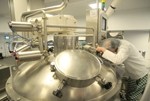Plot thickens for pickle firm

Berkshire-based sauces, pickles and dressings manufacturer English Provender Company (EPC) is reviewing its production operations, since the acquisition of competitor Alembic Products in Chester last year.
While this could see production consolidated at one site, EPC md Gary Blake - now responsible for both sites - refused to be drawn on any outcome until the process is complete. However, he admitted: "We are looking at both sides of our operation."
The Alembic sales operation has already been integrated into Thatcham, said Blake, which now makes EPC a £63M turnover business. "We are looking at buying synergies: better pricing and harmonisation of terms with our suppliers." The company also plans to upgrade its shopfloor data capture systems over the next year or so to improve efficiency and cut waste.
Blake said further acquisitions of businesses providing chilled foods into retail and dealing in herbs and spices were likely over the next few years, once EPC had properly absorbed Alembic. "That might be of interest to us in the future," he claimed.
EPC's 8,361m2 factory at Thatcham was built for £3M in 2004 and has since witnessed investment of around £12M. It employs around 200 staff and produces around 500,000 products a week. It has capacity to expand production output, including the possibility of a night shift. There is also scope for expansion near the existing site.
"There is plenty of capacity in this [Thatcham] site and plenty of capacity in Chester as well. The only barrier on this site is people," said Blake, who added: "We have just negotiated more land with our landlord."
EPC is owned by the Billington's food group, which purchased the company in 1998.
Alembic, which makes similar products, complements EPC's activities by focusing on foodservice, rather than serving the retail and manufacturing sectors. It also produces in sachet pouch formats, rather than packaging in jars, buckets and 'pallecons', which are EPC's forte.
"We are very innovative in products, not packaging," said Blake, who admitted that EPC was looking at changing the glass packaging for some of its products to polyethylene terephthalate (PET) plastic packaging. "This is a potential opportunity for the future," he said.











